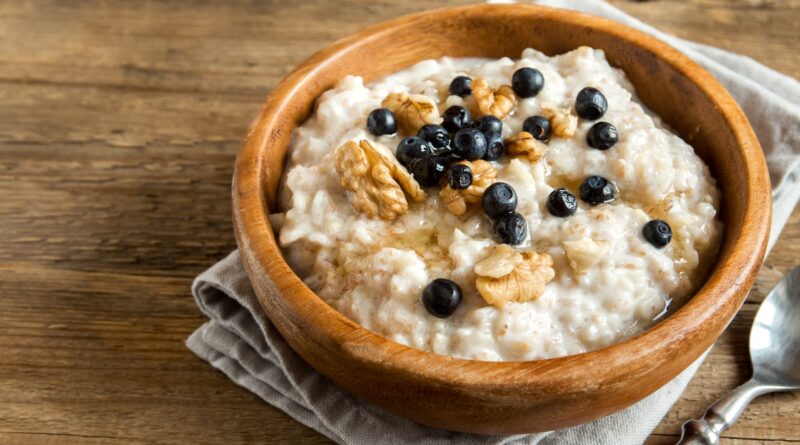Eat these foods to boost your mind for back to school
It is well established that nutrition and learning go hand in hand.
A healthy diet provides essential nutrients that support brain functions such as memory, concentration, reasoning and language.
A child’s brain develops rapidly in the first few years of life and continues to grow during adolescence, highlighting the importance of proper nutrition during the school years.
Eating nutritious meals and snacks throughout the day maintains healthy brain development and helps prevent hunger and daytime fatigue, which can impair attention and focus. feelings.
Our brain depends on a steady intake of many nutrients to think and learn, especially carbohydrates, iron, choline, B vitamins, omega-3 fatty acids and antioxidants.
The following foods can help strengthen the brain of young people, and adults. Consider adding them to your regular list.
Oats
A breakfast of hot oatmeal, baked oatmeal or overnight oats provides brain cells with much-needed carbohydrates. Once digested, carbohydrates are absorbed into the bloodstream as glucose, an essential fuel that the brain relies on.
Rolled and rolled oats also have a low glycemic index. This means that they cause a gradual rise in blood sugar, giving the brain a steady source of energy.
A 2007 randomized controlled trial found that, among children aged six to 11, morning attention and memory declines were significantly reduced by eating low-glycemic cereals compared to high-glycemic grains (eg, refined grains).
Breakfast is for the back to school menu
Eggs
Whole eggs are one of the best food sources of choline, a B-vitamin-like nutrient that is important for brain function. It is used to build strong brain cell membranes and produce acetylcholine, a brain chemical important for memory and emotion.
Choline is important for early brain development and high intake is also associated with better memory performance in healthy adults.
The daily requirements of choline range from 250 to 550 mg, depending on age and sex. One large egg yolk provides 147 mg of nutrients.
Fuel up kids for the school day with a breakfast egg burrito, scrambled eggs and whole grain toast or a homemade breakfast sandwich. Or add a sliced hard-boiled egg to a bento lunch.
Other good sources of choline include edamame, chicken, beef, tuna, red potatoes, green peas, milk and yogurt.
Berries
Blueberries, strawberries, raspberries and blackberries are full of anthocyanins, powerful antioxidants that protect brain cells from harmful free radicals. Research also suggests that anthocyanins increase blood flow and activate areas of the brain that control attention, memory and language.
Mix fresh or frozen berries with milk for breakfast or after school. Add fresh berries to school lunches, toss them in a green salad or stir them into pancake and waffle batters. Red grapes are a good source of anthocyanins as well.
Pumpkin seeds
Also called pepitas, pumpkin seeds are a good source of zinc and iron, minerals needed for normal brain function.
Zinc enhances the health of brain cells and helps communication between them, especially between brain cells involved in memory and learning.
Iron is needed to carry oxygen to the brain cells. It is also used to make the brain chemical acetylcholine.
Sprinkle pumpkin seeds, raw or roasted, on soups, salads and oatmeal, sprinkle on granola or mix them into muffin batters. Enjoy them as a snack on their own or add them to a homemade smoothie.
You’ll also find zinc in milk, yogurt, cheese, eggs and fortified foods such as non-dairy milk, cashews, peas, lentils, quinoa, oatmeal and other whole grains.
Lean beef, edamame, lentils, quinoa, cashews and sunflower seeds are other good sources of iron. The same goes for cooked spinach, which is also an outstanding source of lutein, a phytochemical thought to help improve cognitive function throughout life.
A weak metal? Include these foods in your diet
Salmon
Omega-3 fatty acids in oily fish, especially docosahexaenoic acid (DHA), are important for brain development and function. DHA makes up a large part of brain cells, keeping them flexible so that memory messages can easily pass between brain cells.
Consuming omega-3 fatty acids has also been linked to improvements in learning, memory, mental well-being and blood flow to the brain.
Gram for gram, salmon provides more omega-3 fatty acids than most types of oily fish. It is also one of the few foods that provide a good dose of vitamin D, a nutrient that stimulates the growth and development of brain cells.
Aim to include salmon in your family’s diet twice a week. Canned salmon and smoked salmon also count.
Trout, Arctic char, sardines and albacore tuna are also good sources of omega-3 fats.
Albacore tuna that says “product of/processed in Canada” is low in mercury.
Leslie Beck, a personal trainer in Toronto, is the director of food and nutrition at Medcan. Follow him on Twitter @LeslieBeckRD
#Eat #foods #boost #mind #school
